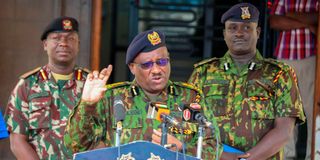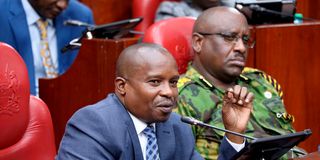Premium
Revealed: Police in plot to cover up deaths arising from Azimio protests

The Inspector General of Police Japhet Koome addressing the Media at Jogoo House, Nairobi on March 26, 2023. Police commanders have been ordered to use communication channels that are only visible to a few officers.
The police will no longer release information on deaths, injuries and damage to property arising from the ongoing anti-government protests by opposition supporters.
This follows an order sent out from Police Headquarters to all Regional Commanders.
It marks a departure from the current procedure where all incidences are filed via the police channel, more commonly referred to as ‘signals’.
The order seen by Sunday Nation advises commanders to use communication channels that are only visible to a few officers within senior ranks of the National Police Service, effectively throwing a blanket of information blackout to the rest of the country.
Police signals are often shared with the public and the media, and they help to verify and disseminate information from security agencies.
“…it’s advisable for you not to mention officers’ names after a serious encounter with not only riotous crowds but also criminals, lest it is used against us. Don’t use open files. Let’s have restricted access to confidential information via email,” reads the order shared on Friday, requiring police to avoid using the signal that goes to all stations and officers.

President William Ruto and Inspector General of Police Japhet Koome at the Jomo Kenyatta International Airport on March 30, 2023.
The order came to light as it emerged that the Raila Odinga-led Azimio la Umoja One Kenya Coalition Party plans to hold police commanders personally liable for any death, injury or destruction of property caused or abetted by their juniors in the ongoing mass action.
Deputy President Rigathi Gachagua yesterday warned that Monday’s protests will not be handled in a ‘business as usual’ manner, indicating that the police ‘will act firmly’ to safeguard people’s lives and property.
Defeat accountability
A high-ranking policeman aware of the communication against the use of Police Signals expressed fears that the censor order could defeat accountability and give some officers a leeway to go scot-free after misusing firearms.
“They are now withholding information and will only later selectively issue statements saying bodies were found with bullet wounds. This is not good even for us in terms of accountability,” said the officer opposed to the move.
The Sunday Nation learnt that top security bosses held a crisis meeting yesterday in the wake of widespread condemnation against the use of excessive force against unarmed civilians and journalists in the past three demonstrations.
The subsequent uproar is said to have attracted the attention of President William Ruto who on Friday had a meeting with Inspector General of Police Japhet Koome and other top police bosses.
In the meeting, the President is reported to have cautioned the police bosses over the deaths reported, advising them to uphold the rule of law and protect lives and property.
“The President has told the officers that they are responsible for the lives of all Kenyans,” disclosed a Ruto ally aware of the meeting.
The order by Vigilance House to County Commanders was released hours after the State House meeting.
The manner of sharing signals is not prescribed in Kenya’s laws governing the police service, according to Mr Isaiah Mugambi, a former police officer who is now a security consultant.
“It is kind of an added service. It’s not in law,” he told Sunday Nation, explaining that signals are sent upwards or downwards as per the existing hierarchies.
Mr Mugambi said signals are exchanged through special frequencies issued to the police service by the Communications Authority of Kenya (CA). There is a control room in every big police station that receives the signals.

Interior Cabinet Secretary Kindiki Kithure and Inspector General of Police Japhet Koome before a joint Parliamentary Committee on Defense, Intelligence and Foreign Relations on March 2, 2023, at County Hall.
The open files mentioned in the Friday communication, he said, are the basic form of all signals.
“All those signals are put in open files. When it comes, it is typed, signed and put in a file,” he said.
He noted that signals are hardly supposed to leak to the public. “They are exclusively meant for the officers. They are always highly confidential.”
Encryption
Leakages, Mr Mugambi said, happen when unscrupulous officers share them via WhatsApp and other social media channels. This, he said, might be the reason why the commanders are being advised to use emails.
“Emails can be traced. But in WhatsApp, you cannot trace everything because it’s encrypted,” said Mr Mugambi. “I think that’s why they want emails rather than signals.”
He, however, noted that emails have been used in transmitting signals in the past.
Last evening, IG Koome convened a crisis meeting with all his directors and top police bosses at police headquarters to discuss how to repair the image of the security agents, including the repeated attack on journalists that has been condemned by, among others, the US ambassador to Kenya Meg Whitman.
“They will disseminate information to regional commanders after they conclude on the measures to be taken to safeguard lives and property. Koome is chairing the meeting,” said an officer aware of last evening’s meeting.
Read: Monday protests: Expect full force of police, IG Koome warns as security of Azimio leaders withdrawn
The Azimio coalition is exploring the concept of command responsibility to deal with top police commanders in the wake of violent attacks on demonstrators as the protests enter the fourth week tomorrow.

The Inspector General of Police Japhet Koome addressing the Media at Jogoo House, Nairobi County on March 26, 2023.
Insiders in the coalition told Sunday Nation that the opposition coalition will deploy the concept adopted by the Director of Public Persecutions (DPP) Noordin Haji, in the Baby Pendo case, which was the first case of crimes against humanity charged under Kenya’s domestic laws using the International Crimes Act.
Baby Pendo was one of the 2017 victims of police brutality who was reportedly clobbered by the police, leading to her death.
Consequently, various police commanders in Kisumu at the time had charges preferred against them in court.
Following the violent response by police against protesters on Thursday last week, Mr Odinga has assembled a team of security and legal experts to determine the orders given by the police that led to the brutality, and what he termed as the shooting of live bullets at his car at least ten times.






